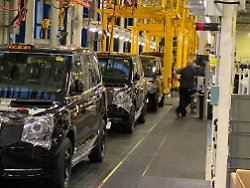Sunday 19th December 2021
All signs point to electro
E-turn is turning the British auto industry inside out
The goal is 2030. Then combustion engines should no longer be permitted in Great Britain. The magic word “electro” is putting the industry under pressure. A company wants to prove itself as a pioneer.
There are dozens of them, shiny black and unmistakable: the famous London taxis, the Black Cabs. The legendary vehicles are manufactured here in a factory on the outskirts of Coventry. An electric motor has long been under the characteristic hood. Jörg Hofmann looks proudly from a balcony into the hall, the German is the boss of the London Electric Vehicle Company (LEVC), as the famous London Taxi Company is now called. Between the black taxis, white spots appear again and again – the Van VN5, the second LEVC model.
The traditional company, now a 100 percent subsidiary of the Chinese manufacturer Geely, could serve as a symbol for the course that British Prime Minister Boris Johnson is taking. The industry is to become more sustainable, greener and lower in emissions. Johnson’s ambitious plan is for diesel and combustion engines to stop rolling off the production lines by 2030. E-charging stations should be mandatory in new buildings as early as next year. This increases the pressure on the industry to reinvent itself. And that at a time when she already has significant problems. Because the Corona crisis and Brexit hit the UK auto industry harder than other industries.
The pandemic is putting a strain on the supply chains and causing shortages of important products such as semiconductors, while the exit from the EU has shaken up trade with buyers and suppliers on the mainland. This can be seen, for example, in bilateral trade with Germany: “While German exports to the United Kingdom so far this year almost reached the level of the previous year, the value of the very important car exports in particular fell by 14.1 percent in the same period,” says Marc Lehnfeld from the state-owned company Germany Trade and Invest.
“We are only at the beginning”
According to his own statement, LEVC boss Hofmann has hardly felt the Brexit. The corona pandemic is all the stronger. Sales have plummeted by more than 50 percent. “There are around 18,000 taxis in London, all but a small number of which were parked and gone,” says the former Audi boss in Brazil. “The taxi drivers no longer had a job, were at home. There were no more customers.” And where there is no demand, there is of course no market.
Hofmann is all the more optimistic now. Because he sees his company perfectly positioned for the E-Wende. With taxis, which are also in demand in Germany for so-called ride-sharing offers, and small delivery vans, LEVC already offers models in two important segments. It shouldn’t stop there: an e-camper will be added in 2022, a larger delivery van is also being considered, and finally Hofmann is also considering the production of an e-bus. “I cannot imagine that stinking city diesel buses will still be driving around in ten years. We are only at the beginning.”
The trend speaks for manufacturers such as LEVC, and the larger car manufacturers are gradually converting their production. That has long been reflected in the numbers. According to the industry association SMMT, electric vehicles already accounted for more than a quarter of new registrations between January and November. In return, the market share of gasoline-powered vehicles fell below 50 percent, and the number of newly registered diesel vehicles almost halved compared to the previous year’s figure.
Battery technology is expensive
Great Britain needs successes of this kind after Brexit. The announcement by Nissan that a battery factory will be built at its plant in Sunderland, northeast England, played into Premier Johnson’s hands. On the site’s 35th birthday, Nissan recently announced that it would be launching its first Bluebird Job 1 model under the name Newbird as an electric car. Alone: More is needed to secure the UK as an automotive location with around 860,000 jobs in the long term.
In the opinion of the industry, financial support remains important. “We still need support as long as the battery technology is so expensive,” says LEVC boss Hofmann. “But at the moment we are in a critical phase. If subsidies are cut now, the slow-growing plant may die.”
It is clear that Hofmann and the other industry representatives do not like the latest government plans. Because the subsidies will be cut significantly: instead of £ 2,500, buyers of e-cars can only claim £ 1,500. That goes for vehicles that cost a maximum of £ 32,000, which is also down from £ 35,000. The decision will come at the worst possible time, according to the SMMT. Because corona consequences for the economy and the enormously increased inflation are causing an ebb in the pockets of consumers anyway. Difficult outlook for 2022.
